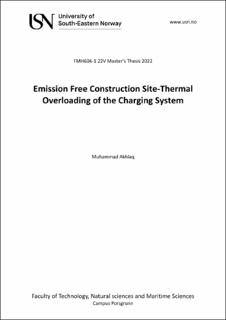| dc.description.abstract | In Norway, many municipalities set the target toward the emission-free construction site. Skagerak Energi also took a step toward this emission-free construction site by charging the construction machinery with the help of a mobile battery. To replace the typical diesel/petrol engine machinery with the electric battery fast charging of construction machinery batteries is most important. Charging Cable plays a critical role in the whole setup as it always carries a high current from ten to a hundred amperes of current. High currents put a lot of thermal stress on the cable and as a result, heat will damage the cable insulation aging materials. So, in this thesis, the thermal overloading of the Combined Charging System (CCS-2) cable is analyzed by doing the different tests on the DC part of the cable such as the DC Resistance Test, Temperature rise test on the rated current of the cable, and Overloading test in the University high Current lab.
DC resistance test helps to check the quality, Power loss in the cable, and temperature rise of the cable. As higher resistance will generate more heat in the cable. The temperature rise test evaluates the performance of the cable and checks cable does not overheat during operation. As every construction site has different construction machinery so overloading tests are performed to check the overloading capacity and how much time it will take to cross the IEC temperature limit when 20 is the ambient temperature. Based on the results charging model is proposed to avoid the thermal overloading of the charging system. On the rated current 250A the CCS-2 cable will take approximately 3 hours to get the steady-state temperature without getting the overheated. It means the rated current does not affect the thermal characteristics of the cable and charges the batteries on the construction site without crossing the IEC limit. The CCS-2 cable will take 23 minutes to cross the IEC temperature limits in the case of overloading when supplying 350A and in the case of 300A, the cable can be overloaded for 45 minutes when the ambient temperature on the construction site is 20. The DC resistance of the cable contact is 84. A thermal model of the cable using the electrical analogy would help to determine the temperature rise in every component and when the temperature becomes critical for the charging cable. | |
